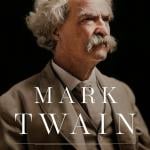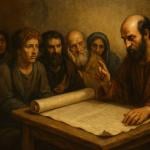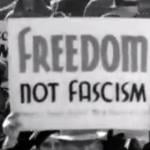TODAY IN GOD:
RELIGION NEWS BITES FOR YOUR SNACKING PLEASURE
EDITOR’S NOTE: It’s baaaaaa-aaaaaaaack!
After a months-long absence while GG completed the book manuscript for Sin Boldly, our mostly-daily religion-and-spirituality news blog is back. Please for to enjoy …
Clinton, Obama found faith in the Land of Lincoln
The Democratic presidential race is down to two senators with roots in the state of Illinois. And although Barack Obama wasn’t born in the state, it was in the land of Lincoln that both he and Hillary Clinton found their connection to faith.
Obama found religion in his mid-20s, after moving to Chicago in the 1980s. As a community organizer in the city’s depressed south side, Obama began attending services at Trinity United Church of Christ, a black “mega-church” that stresses black self-reliance and community service. The title of Obama’s recent best-seller, The Audacity of Hope, comes from a sermon given by that church’s senior pastor, the Rev. Jeremiah Wright Jr.
Melissa Harris-Lacewell, an associate professor of politics and African-American studies at Princeton University, worshipped with Obama and his family when she lived in Chicago. Harris-Lacewell says the church’s message drew people to the faith.
“I suspect that it was exactly that message, that ‘You are good enough, God loves you, and if you want to demonstrate your love back to God, your responsibility is to your fellow men and women’ — that was the attractive thing that finally led Barack Obama to actually join a church,” she says.
In the predominantly white suburb of Park Ridge, to Chicago’s northwest, Clinton grew up as an active member of the city’s First United Methodist Church.
“She is one of the most committed Christians I know,” said Rev. Don Jones, who served as the church’s youth pastor when Clinton attended in the 1960s.
FOR THE FULL STORY WITH AUDIO (WEEKEND EDITION AT NPR.COM) CLICK HERE
Some non-Christians feel left out of election
DALLAS — In a U.S. election campaign where presidential candidates from both major parties have talked openly about their Christian faith, some non-Christians feel shut out or turned off.
Despite the constitutional separation of church and state, religion plays a big and sometimes decisive role in politics in America, where levels of belief and regular worship are far higher than those in Europe.
“Non-Christians are concerned that they will be excluded from the process,” said Ahmed Rehab, a spokesman with the Council on American-Islamic Relations.
“I welcome faith values if they inspire candidates to do good things. But I worry if it is used as a litmus test to include someone in political participation.”
About 75 percent of the U.S. population, long a melting pot of immigrants from around the world, identifies itself as Christian, according to several estimates.
That is a huge but divergent source of potential votes for Republican and Democratic candidates in their long contest for the nomination to run for the White House in the November election.
U.S. politicians are not shy of talking about their religion and regularly appear in church.
In recent decades, part of the American political drama has been scripted by the “religious right” — mostly white evangelical Protestants united by strong opposition to abortion and gay marriage who have been a key base of support for the Republican Party.
Republican hopeful Mike Huckabee, who scooped up strong evangelical support but whose campaign is fading ahead of next Tuesday’s nominating contests across the country, is a Baptist preacher who peppers his speeches with Biblical allusions.
Mitt Romney is a Mormon who was moved to address questions about his faith in a speech in December. John McCain has long sought to smooth relations after including leaders of the religious right among those he called “agents of intolerance” during his failed presidential bid in 2000.
The leading Democratic presidential contenders have also been open and candid about their faith.
That faith, and that of the Republican candidates, is Christian, although candidates have also spoken about the need for religious tolerance.
A false rumor that has circulated on the Internet about Democratic candidate Barack Obama, whose father was Kenyan, is that he is Muslim who has lied about his religion. The rumor appears to illustrate the importance some voters attach to a candidate being Christian.
FOR THE FULL STORY (REUTERS) CLICK HERE
Evangelical Democrats, Exit Polls and a Matter of Balance
If a tree falls in the forest and no one is there to hear it, does it make a sound? If a born-again Christian votes in a Democratic primary and no exit poll records it, does it matter?
If you want to know what percentage of voters in the Republican caucuses and primaries described themselves as born-again or evangelical Christians — and whom they voted for — exit polls will tell you. If you want to know what percentage of voters in the Democratic caucuses and primaries consider themselves born-again or evangelical Christians, well, sorry. No one knows.
No one knows because the exit polls did not ask.
Let’s be clear. Exit polls cannot ask about everything. The questionnaires handed voters hurrying away from polling places cannot be any longer than two sides of a single sheet of paper. Pollsters have to make choices. And representatives of ABC News, CBS News, CNN, Fox News, NBC News and The Associated Press, who have formed the National Election Pool that has conducted state and national exit polls since 2003, have good reason to be tight-lipped about what goes into making those choices.
Still, it has not gone unnoticed that in five states, voters in Republican contests were asked their religious affiliation, and in four states they were asked how frequently they attended religious services. Voters in Democratic contests were asked those questions in only three states.
In four states, voters for Republican candidates were asked how much it mattered that a candidate shared their religious beliefs. Nowhere was that question put to voters for Democratic candidates.
And most notably, in every state voters in Republican caucuses and primaries were asked if they were born-again or evangelical Christians. Voters in Democratic caucuses and primaries were never asked.
FOR THE FULL STORY (PETER STEINFELS’ “BELIEFS” COLUMN IN THE NYT) CLICK HERE
NFL Pulls Plug On Big-Screen Church Parties For Super Bowl
For years, as many as 200 members of Immanuel Bible Church and their friends have gathered in the church’s fellowship hall to watch the Super Bowl on its six-foot screen. The party featured hard hitting on the TV, plenty of food — and prayer.
But this year, Immanuel’s Super Bowl party is no more. After a crackdown by the National Football League on big-screen Super Bowl gatherings by churches, the Springfield church has sacked its event. Instead, church members will host parties in their homes.
Immanuel is among a number of churches in the Washington area and elsewhere that have been forced to use a new playbook to satisfy the NFL, which said that airing games at churches on large-screen TV sets violates the NFL copyright.
Ministers are not happy.
“There is a part of me that says, ‘Gee, doesn’t the NFL have enough money already?'” said Steve Holley, Immanuel’s executive pastor. He pointed out that bars are still allowed to air the game on big-screens TV sets. “It just doesn’t make sense.”
The Super Bowl, the most secular of American holidays, has long been popular among churches. With parties, prayer and Christian DVDs replacing the occasionally racy halftime shows, churches use the event as a way to reach members, and potential new members, in a non-churchlike atmosphere.
“It takes people who are not coming frequently, or who have fallen away, and shows them that the church can still have some fun,” said the Rev. Thomas Omholt, senior pastor of St. Paul’s Lutheran Church in the District. Omholt has hosted a Super Bowl party for young adults in his home for 20 years. “We can be a little less formal.”
The NFL said, however, that the copyright law on its games is long-standing and the language read at the end of each game is well known: “This telecast is copyrighted by the NFL for the private use of our audience. Any other use of this telecast or any pictures, descriptions, or accounts of the game without the NFL’s consent is prohibited.”
FOR THE FULL STORY (WASHINGTON POST) CLICK HERE
Needing a Hail Mary, Fans Find a Monastery
PHOENIX — There is no sauna, no heated pool, no chauffeur or sommelier. In fact, no alcohol is allowed on the premises, and guests share a bathroom with their next-door neighbor.
But for $250 a night in a city where Super Bowl rentals are topping out at $250,000 a week for a mansion in Scottsdale, the sisters at Our Lady of Guadalupe Monastery figure they have an offer that cannot be beat.
In debt from the recent purchase of a nearby parcel, the Benedictine nuns are hoping to make a dent in their mortgage by converting their 10-bedroom spiritual retreat into a crash pad for Super Bowl fans this weekend.
“A Super Bowl doesn’t happen in a city very often,” said Sister Linda Campbell, the prioress of the monastery where rooms usually go for $105 a night. “Then we heard of all the folks that were renting out homes and we thought, wow, that would be something that would be beneficial to the monastery and help us to help others.”
With 125,000 fans expected to arrive from out of town this weekend, even midlevel hotels are charging more than $500 a night for rooms. A Hampton Inn, for example, is sold out for the weekend at prices up to $799 a night. Not far away, a Residence Inn by Marriott on Wednesday still had a two-bedroom suite available for $999 a night.
With its posters of Mother Teresa, vinyl tablecloths and second-hand furniture, the monastery’s offerings do not match up to some of the Super Bowl packages that nearby hotels and resorts are offering, with free cocktail hours, personal concierge service and sometimes even a meet-and-greet with N.F.L. players. Though there is no curfew at the monastery, some Super Bowl visitors may be dismayed to learn that along with the ban on alcohol (forget about keg stands or late-night drinking games), overnight guests cannot smoke.
Guests at the monastery will sleep in single beds in rooms named after Saints Hildegard, Helen, Monica and Ann. Most of the rooms sleep three people, and there is no telephone or television in the rooms.
FOR THE FULL STORY (NEW YORK TIMES) CLICK HERE
Church airs ads targeting scientists
Hoping to mend a millennium-old feud between religion and science, the United Church of Christ launched a new web-based advertising campaign geared toward the scientific and technological communities. The UCC purchased ads on more than 30 popular science-oriented blogs during February to promote a pro-science, pro-faith message, UCC News Service reported Tuesday.
The campaign is part of the UCC’s “God is still speaking” identity effort, a multi-million-dollar initiative that included national TV, radio, web and print advertising. The web-based ads will link to an expanded “faith and science” section on the UCC’s website dubbed “not mutually-exclusive” and direct visitors to UCC congregations.
The UCC also is hosting a sermon-writing contest on science and technology for pastors and seminarians, with two $500 top prizes, and the denomination is asking local churches to honor persons working in science-related professions during worship services on Sunday, May 18.
“A New Voice Arising: A Pastoral Letter on Faith Engaging Science and Technology,” as well as information about the UCC’s science-related advertising effort, is available at ucc.org/not-mutually-exclusive.
SOURCE: UPI VIA RELIGIONANSPIRITUALITY.COM
Work starts on Hindu cow centre
Building work is to start on a cow and working oxen protection centre at a Hertfordshire Hindu temple.
The unit at the Bhaktivedanta Manor temple near Watford will be dedicated to Gangotri, a 13-year-old cow put down by lethal injection by RSPCA officers.
This act sparked outrage and a campaign to change the UK law on animal cruelty.
A temple spokesman said Hindus regard cows as sacred and should be exempted from cruelty laws, but the RSPCA challenges the campaign for change.
The RSPCA said the cow had been sick and was suffering.
The spokesman for the Hare Krishna temple said that some suffering was part of life and it was a outrage to kill the animal on ground the Hindus regarded as sacred.
“Followers of religions such as Islam and Judaism have immunity from the laws because their animals are killed for religious food.
“Hindus try to preserve life and are vegetarian. We want the same treatment to allow our cows and oxen to die naturally.
“Our new protection centre is designed to care for the animals from birth to death.”
FOR THE FULL STORY (BBC NEWS) CLICK HERE
Should a Clubhouse Be a Chapel?
The highlight of Josh Miller’s eight-year minor league umpiring career came last June, when he was the plate umpire in Roger Clemens’s final warm-up start before he resumed his major league career with the Yankees.
The lowlight of Miller’s career — besides being released at the end of last season, that is — was the discomfort he experienced throughout his career over participating in baseball chapel services every Sunday morning.
“From Day 1 it was uncomfortable,” Miller, 31, said. “I was in extended spring training, and on Sunday there was a knock on the door. I thought it was a joke. This guy was coming to preach to us in our little locker room. He had two little handouts that said Baseball Chapel and prayer of the week.”
Baseball Chapel, an evangelical group, has existed for 35 years and supplies Sunday morning chapel leaders to all major and minor league teams. “Our purpose is to glorify Jesus Christ!” its Web site, baseballchapel.org, proclaims.
“They preach to you,” Miller said in a telephone interview. “Some are more overbearing than others. At the end they ask if you have anything ‘you want me to pray for.’ The other guys would say ‘our families, safe travel.’ I’d say nothing. Then they would pray. It was very uncomfortable. They’d say Jesus this and Jesus that. At the end they’d say ‘in Jesus’ name.’ ”
In chapel services for the teams, players have the option of attending or not. Umpires may not realistically have that option.
“The players go to a separate room,” Miller said of the chapel services for the team. “For umpires, they always came to our room. They didn’t want to mix players with umpires even though they often mix the teams.”
The Sunday routine left Jewish umpires, like Miller, in a difficult position. With the umpires’ locker room as a setting for Christian prayer, they could not avoid it.
FOR THE FULL STORY (MURRAY CHASS’ “ON BASEBALL” COLUMN IN NYT) CLICK HERE
Muslim woman sues hairdresser for job descrimination
A Muslim woman suing an Islington hairdresser for religious discrimination says she has received hate mail and has more than doubled her compensation claim.
Bushra Noah, 19, took legal action against salon owner Sarah Desrosiers after she was turned down for a job at Wedge, in Caledonian Road, because of her Muslim headscarf.
Miss Desrosiers, 32, turned the teenager down following a trial day last March saying it was a basic job requirement that customers be able to see her stylists’ hair.
An employment tribunal was due to start on January 16 but was postponed at the last minute when Miss Noah upped her compensation claim from £15,000 to £35,000 in damages.
Miss Noah claims she has received hate mail because of the high profile press coverage the case has attracted.
Miss Desrosiers said: “I found out she’s claiming that she’s got hate mail as a result of the publicity. That’s beyond my control.”
Canadian-born Miss Desrosiers faces financial ruin if she loses but says she does not regret her decision.
FOR THE FULL STORY (ISLINGTON [U.K.] GAZETTE) CLICK HERE















